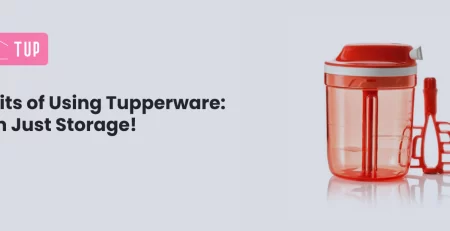
Tupperware’s Role in Reducing Single-Use Plastics: A Sustainable Revolution
tupperware4home2024-11-25T12:01:55+05:30In an era where environmental sustainability is a pressing global concern, reducing single-use plastics has become paramount. Tupperware, a pioneer in durable and reusable food storage solutions, has played a pivotal role in this eco-friendly movement. Let’s explore how Tupperware has contributed to combating the single-use plastic crisis and why it is a cornerstone in sustainable living.
The Environmental Impact of Single-Use Plastics
Single-use plastics, such as bags, bottles, and food packaging, are among the most significant contributors to pollution. These plastics often end up in landfills or oceans, taking hundreds of years to decompose and causing harm to wildlife and ecosystems. According to the UN, around 300 million tons of plastic waste are generated every year, and at least 14 million tons find their way into the oceans.
This alarming trend has heightened the need for innovative solutions to replace disposable plastic items—and Tupperware provides a compelling answer.
How Tupperware Champions Sustainability
Tupperware’s innovative approach to food storage emphasizes durability, reusability, and eco-consciousness. Here’s how Tupperware contributes to reducing single-use plastics:
Unlike single-use plastics, Tupperware products are built to last for years. Their high-quality materials resist wear and tear, reducing the frequency of replacement and minimizing waste.
2. Encouraging Reusability
Tupperware’s design enables users to replace disposable containers, bags, and wraps. For example:
– Reusable Lunch Containers: Perfect for packing meals without using plastic wrap or foil.
– Eco-Friendly Water Bottles: A sustainable alternative to single-use plastic bottles.
3. Promoting Waste-Free Living
Tupperware aligns with the zero-waste movement by offering storage solutions that help reduce food waste. Airtight seals and smart designs keep food fresh for longer, reducing the need for disposable storage options.
4. Supporting Circular Economy Practices
Tupperware is committed to sustainability by incorporating recycled materials into their manufacturing processes and offering programs for product recycling.
Empowering Sustainable Lifestyles
Tupperware doesn’t just provide products—it promotes a lifestyle. By adopting Tupperware’s solutions, households can drastically reduce their reliance on single-use plastics. This has a ripple effect, inspiring communities to embrace sustainability and make conscious choices.
Tupperware’s Global Initiatives
As a global brand, Tupperware takes its responsibility seriously. The company has launched various initiatives to reduce plastic waste, including partnerships with environmental organizations and awareness campaigns about plastic pollution. Tupperware’s involvement in community-driven sustainability projects further solidifies its leadership in the green movement.
Tips for Reducing Single-Use Plastics with Tupperware
1. Replace plastic bags with Tupperware containers for grocery shopping.
2. Use Tupperware water bottles instead of disposable ones.
3. Store leftovers in Tupperware bowls to eliminate the need for plastic wraps.
4. Encourage schools and workplaces to adopt reusable Tupperware lunch kits.
The Future of Sustainable Living with Tupperware
Tupperware’s role in reducing single-use plastics is not just about the products—it’s about fostering a global mindset. By choosing Tupperware, consumers take an active role in protecting the planet, one reusable container at a time. As the world shifts towards a more sustainable future, Tupperware remains a steadfast ally in the fight against plastic pollution.
Conclusion
Tupperware’s impact on reducing single-use plastics is undeniable. From offering durable alternatives to raising awareness about sustainability, the brand has become synonymous with eco-friendly living. By incorporating Tupperware into daily life, we can each contribute to a cleaner, greener planet—one container at a time.

